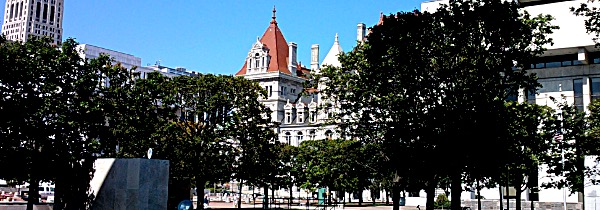- By New York State Governor's Office
- News
 Print
Print 
Governor Andrew M. Cuomo announced six victim assistance programs in the Finger Lakes region will receive approximately $1.7 million in grants to hire attorneys who will assist crime victims with civil legal matters resulting from their victimization. These programs are among 61 statewide that will receive nearly $16 million in federally funded grants, administered by the state Office of Victim Services, to provide free legal services to crime victims in civil matters, such as matrimonial, custody, immigration and financial issues.
"Crime victims shouldn't be left to navigate the legal system without proper representation, just because they lack financial resources," Cuomo said. "This grant funding will help ensure all victims of domestic violence and other crimes in the Finger Lakes and beyond have equal access to the resources they need to find competent and compassionate legal assistance."
Lieutenant Governor Kathy Hochul announced the grants in Rochester with Planned Parenthood of Central and Western New York, one of the six grant recipients in the Finger Lakes region. The organization will receive $479,029 for the first year of a five-year contract with the Office of Victim Services, using the funding to provide free legal assistance to individuals served by its RESTORE sexual assault services program, which assists individuals in Monroe, Genesee, Livingston, Orleans and Wyoming counties.
The other organizations in the Finger Lakes Region receiving funding are:
- Cayuga Counseling Services Inc. - $131,524 to serve Cayuga and Onondaga counties
- Legal Aid Society of Rochester - $111,212 to serve Monroe County
- Safe Harbors of the Finger Lakes Inc. - $104,572 to serve Ontario, Seneca and Yates counties
- Victim Resource Center of the Finger Lakes Inc. - $93,744 serving Wayne, Ontario, Yates and Seneca counties
In addition, the Empire Justice Center will receive $811,995 to serve crime victims in Monroe county, where its main office is located, as well as Nassau, Suffolk and Westchester counties. Click here to see all grant recipients.
Crime victims often face numerous hurdles that can prevent them from securing legal representation in civil matters. Some can't afford an attorney or are unaware of the pro bono legal services available to them in their community. In addition, victims of certain crimes, such as domestic violence involving undocumented immigrants, human trafficking and elder abuse, may be reluctant to seek assistance because of fear or embarrassment.
"My mother was an early advocate for victims of domestic violence, and that's why I'm particularly proud that we're leading the nation in our fight against domestic violence and holding offenders accountable," said Lieutenant Governor Kathy Hochul, who made today's announcement. "Victims of a crime should have proper representation and access to the resources they need during their time of need. This grant funding will help to provide assistance to victims of domestic violence and other crimes, providing them with attorneys to help with civil legal matters. There is a lack of legal services available to victims, particularly those of low income and from high-needs communities. With this funding, we are ensuring all victims receive the care they need and the justice they deserve."
Victim assistance programs will use these grants, funded through the federal Victims of Crime Act, to hire or contract attorneys who will represent individuals in civil matters resulting from their victimization. For example, victims of intimate partner violence, child abuse, sexual assault, elder abuse and human trafficking may need assistance with protective or restraining orders; face issues with housing or custody; or need legal intervention with creditors and other entities because of identity theft or financial fraud. These attorneys also may file motions with the court to vacate convictions; State law allows individuals convicted of certain prostitution crimes who are determined to be victims of certain sex or labor trafficking to seek that remedy.
Office of Victim Services Director Elizabeth Cronin said, "Crime victims should never have to face civil legal proceedings without representation, but this often happens -- especially to individuals with limited income or those from traditionally marginalized populations. With this funding, we can help ensure that crime victims throughout the state have the resources they need to navigate the civil litigation process and have competent, compassionate counsel when they need it."
Attorneys funded through these grants will also help individuals who seek civil legal assistance through New York Crime Victims Legal Help, a new website created by the Office of Victim Services in partnership with the Empire Justice Center, Pro Bono Net and the Center for Human Services Research at the University at Albany. The website, which features a screening tool and legal help directory, is being piloted in Erie, Genesee and Niagara counties and will be available in the state's 57 counties outside of New York City by the end of 2019.
In addition, attorneys hired or contracted through these grants will be required to complete 15 hours of training within the first year of their hiring; a portion of this training must include the impact trauma can have on crime victims and how it may affect their legal representation.
The Office of Victim Services funds a network of 222 victim assistance programs that provide direct services, such as crisis counseling, advocacy and emergency shelter, across the state. Each of those victim assistance programs was eligible to apply for this funding, which will run through 2023.
The agency provides a safety net for crime victims and/or their family members, helping eligible individuals with medical and counseling expenses, funeral and burial expenses, lost wages and support, in addition to other assistance, all at no cost to taxpayers. All funding that assists eligible individuals, as well as nearly all of the funding provided to victim assistance programs, comes from the same source: fines, fees and surcharges paid by certain offenders convicted in federal and state court.
v14i41



